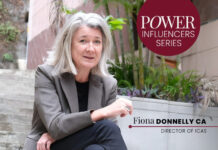Interview with Suzanna Pomeroy, Director of the Circular Cities Asia
We know that the circular economy makes sense if we really care about sustainability. But how can young entrepreneurs and change makers know where to start? And where can they find inspiration and practical guidance? Enter Circular Cities Asia.
Can you share with us the origin story of Circular Cities Asia and what inspired you to spearhead this initiative?
In 2021, the Circular Cities Asia platform launched as a youth innovation education provider. We started partnering with universities across Asia to inspire engagement in circular economy and design thinking, and we knew we were on to something when our first programme attracted 2,000 students from seven countries. We are constantly motivated by the opportunity to engage with young people and stakeholders across the sector in Asia to fill the circular economy education gap and to support young change makers to develop entrepreneurial ventures that benefit their local communities.
Circular Cities Asia is committed to accelerating circular innovation in Asian cities. Could you elaborate on some of the key initiatives or projects the organisation has undertaken towards this goal?
A circular economy is essential in the fight against climate change. What is missing sometimes is being able to cut through the technical concepts and knowing where to start. Circular Cities Asia develops practical tools and learning experiences that kick-start many organisations’ and individuals’ circular design journeys.
Our incubation programme further enables start-ups to develop their ideas, along with micro-grants to validate their solutions. We are circular economy innovation trainers and offer design-thinking workshops, open innovation competitions, and trainer workshops for academics.
How does Circular Cities Asia engage with stakeholders such as governments, businesses, and communities to promote circular economy practices in Asian cities?
We have designed a highly immersive experience delivered through virtual learning. This means we can reach a large volume of learners in different countries. It is extremely impactful and very cost-effective for funders and partners.
Our greatest relationships have been with the universities that we partner with across many diverse areas of South and Southeast Asia. We work with academics dedicated to providing opportunities for young people to engage in new sectors, differentiate themselves in the market, and learn in-demand skills. The universities can see that waste is an economic opportunity, and when waste is viewed through a business model, the transition to sustainability is accelerated. We welcome universities from any country to discuss opportunities to join our cohort.
The Circular Stories Programme sounds like a fantastic opportunity for youth in Southeast Asia. Could you tell us more about this initiative and its impact on fostering a culture of sustainability and innovation among the younger generation?
We are really excited to be offering this new programme providing the opportunity for any young person between 18 and 25 in SE Asia to learn from inspirational experts in journalism and storytelling. This free experiential course immerses the participants in their local communities. By doing this, we hope to remove the complexity of the circular economy and help them discover real-life examples of grassroots circular design, and to inspire them to tell the stories of local heroes who are solving local environmental problems.
What criteria do you look for when selecting stories for the Circular Stories Programme, and how do you envision these stories inspiring others to adopt circular economy practices?
We are interested in pitches for stories about local solutions to local problems by local people. Participants will be tasked with finding and showcasing local circular economy innovations addressing environmental waste issues. We want participants to express themselves in ways that resonate with their local community, and for the stories to reach a wide audience.
By participating in the Circular Stories Programme, participants are not just gaining skills or knowledge; they are becoming pivotal voices in the movement towards a more sustainable future. Their stories will amplify the efforts of local innovators, spreading awareness and motivating others to choose a circular future.
Sustainable development is a pressing issue globally, particularly in rapidly developing regions like Asia. How do you see Circular Cities Asia’s commitment to sustainable development contributing to positive change in the region?
We have reached the point where the circular economy is no longer just a catchphrase. The advantages of reduce-reuse-recycle over a linear use-and-throw model are now clear – to every government, business, and emerging leader that wants to build a sustainable future.
We are focused on growing the top in-demand skills for the future: green skills, innovation, design thinking, and entrepreneurial approaches. Through the experiences that we provide, we aim to change mindsets and behaviours, and provide inspiration for entrepreneurial solutions to the world’s waste issues.
In your opinion, what are some of the biggest challenges Asian cities face in transitioning to a circular economy, and how is Circular Cities Asia working to address these challenges?
Transitioning to a circular economy involves the transformation of deep-rooted systems, and the concept of a circular economy itself can seem complex. The part that Circular Cities Asia plays is to empower the next generation to see past this complex world problem and view every environmental waste challenge as an entrepreneurial opportunity.
Collaboration is often key to driving meaningful change. Can you share examples of successful collaborations Circular Cities Asia has been a part of, and how they have contributed to advancing the circular economy agenda in Asia?
Our collaboration with the Regional Project Energy Security and Climate Change Asia-Pacific (RECAP) of the Konrad Adenauer Stiftung (KAS) has meant we have had the support to execute our flagship Circular Campus Programme, resulting in over 6,000 young participants across seven countries, and relationships with 30 universities. This collaboration has supported 13 student teams with seed funding and mentoring through a virtual incubator.
A fantastic example of the impact of this collaboration has been our relationship with Bataan State University (BPSU) in the Philippines. BPSU’s student teams have been amongst the winners of every competition we have run, securing seed funding for student businesses and micro-grants for student research. BPSU uses this collaboration’s success as a case study for securing further government funding.
Most recently, our partnership to deliver an open innovation competition with Deutsche Gesellschaft für Internationale Zusammenarbeit (GIZ) in the Philippines resulted in several innovative solutions to marine waste, one of which has secured further funding to pilot their solution in their local community.
As the Director of Circular Cities Asia, what are your personal goals and aspirations for the organisation in the coming years?
We want to keep closing the circular economy education gap and inspire more local entrepreneurial solutions to environmental waste problems. There is no limit to the impact that can be made in this space, and I encourage any corporate, funder, impact organisation, or academic to join us in our mission!
Finally, looking ahead to the future, what is your vision for the role of circular economy principles in shaping the sustainable development landscape of Asian cities?
Over time, the circular economy will teach us to see every piece of waste as something that holds value and opportunity, reducing the need to mine the earth for resources that we can keep in circulation.
Executive Profile

Suzanna Pomeroy is the driving force behind Circular Cities Asia, pioneering impactful education initiatives to accelerate the circular economy. She has an MA in Philanthropic Studies and is a Global Fellow of the Moving Worlds Institute. Suzanna specialises in capacity building and cross-sector collaboration. Her recent work has been focused on empowering young entrepreneurs to tackle waste issues with innovative business models.




































































